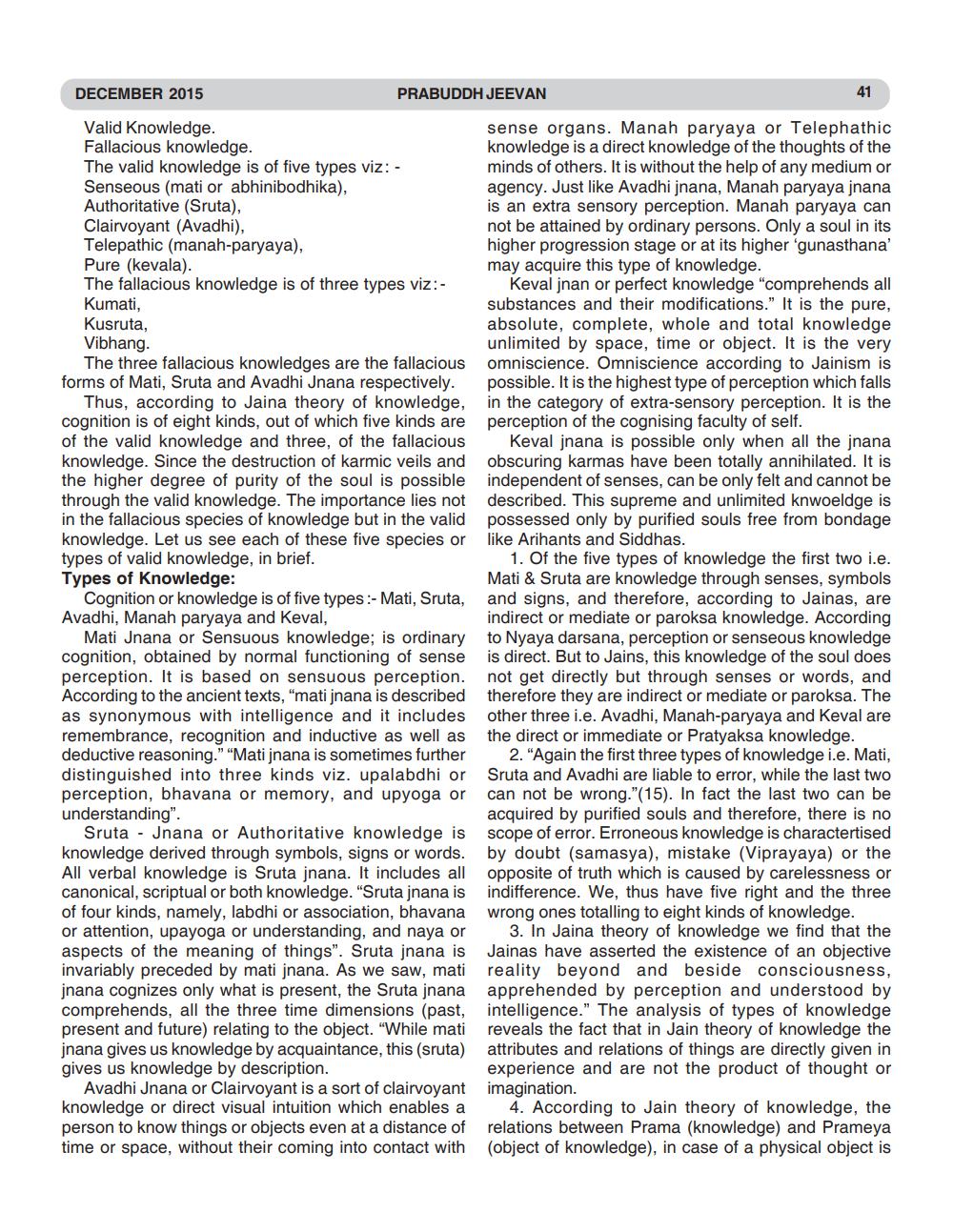________________
DECEMBER 2015
PRABUDDH JEEVAN
41
Valid Knowledge.
sense organs. Manah paryaya or Telephathic Fallacious knowledge.
knowledge is a direct knowledge of the thoughts of the The valid knowledge is of five types viz: -
minds of others. It is without the help of any medium or Senseous (mati or abhinibodhika),
agency. Just like Avadhi jnana, Manah paryaya jnana Authoritative (Sruta),
is an extra sensory perception. Manah paryaya can Clairvoyant (Avadhi),
not be attained by ordinary persons. Only a soul in its Telepathic (manah-paryaya),
higher progression stage or at its higher 'gunasthana' Pure (kevala).
may acquire this type of knowledge. The fallacious knowledge is of three types viz:- Keval jnan or perfect knowledge "comprehends all Kumati,
substances and their modifications." It is the pure, Kusruta,
absolute, complete, whole and total knowledge Vibhang.
unlimited by space, time or object. It is the very The three fallacious knowledges are the fallacious omniscience. Omniscience according to Jainism is forms of Mati, Sruta and Avadhi Jnana respectively. possible. It is the highest type of perception which falls
Thus, according to Jaina theory of knowledge, in the category of extra-sensory perception. It is the cognition is of eight kinds, out of which five kinds are perception of the cognising faculty of self. of the valid knowledge and three, of the fallacious Keval jnana is possible only when all the inana knowledge. Since the destruction of karmic veils and obscuring karmas have been totally annihilated. It is the higher degree of purity of the soul is possible independent of senses, can be only felt and cannot be through the valid knowledge. The importance lies not described. This supreme and unlimited knwoeldge is in the fallacious species of knowledge but in the valid possessed only by purified souls free from bondage knowledge. Let us see each of these five species or like Arihants and Siddhas. types of valid knowledge, in brief.
1. Of the five types of knowledge the first two i.e. Types of Knowledge:
Mati & Sruta are knowledge through senses, symbols Cognition or knowledge is of five types:- Mati, Sruta, and signs, and therefore, according to Jainas, are Avadhi, Manah paryaya and Keval,
indirect or mediate or paroksa knowledge. According Mati Jnana or Sensuous knowledge; is ordinary to Nyaya darsana, perception or senseous knowledge cognition, obtained by normal functioning of sense is direct. But to Jains, this knowledge of the soul does perception. It is based on sensuous perception. not get directly but through senses or words, and According to the ancient texts, "mati jnana is described therefore they are indirect or mediate or paroksa. The as synonymous with intelligence and it includes other three i.e. Avadhi, Manah-paryaya and Keval are remembrance, recognition and inductive as well as the direct or immediate or Pratyaksa knowledge. deductive reasoning." "Matijnana is sometimes further 2. "Again the first three types of knowledge i.e. Mati, distinguished into three kinds viz. upalabdhi or Sruta and Avadhi are liable to error, while the last two perception, bhavana or memory, and upyoga or can not be wrong."(15). In fact the last two can be understanding".
acquired by purified souls and therefore, there is no Sruta - Jnana or Authoritative knowledge is scope of error. Erroneous knowledge is charactertised knowledge derived through symbols, signs or words. by doubt (samasya), mistake (Viprayaya) or the All verbal knowledge is Sruta jnana. It includes all opposite of truth which is caused by carelessness or canonical, scriptual or both knowledge. "Sruta jnana is indifference. We, thus have five right and the three of four kinds, namely, labdhi or association, bhavana wrong ones totalling to eight kinds of knowledge. or attention, upayoga or understanding, and naya or 3. In Jaina theory of knowledge we find that the aspects of the meaning of things". Sruta jnana is Jainas have asserted the existence of an objective invariably preceded by mati jnana. As we saw, mati reality beyond and beside consciousness, jnana cognizes only what is present, the Sruta jnana apprehended by perception and understood by comprehends, all the three time dimensions (past, intelligence." The analysis of types of knowledge present and future) relating to the object. "While mati reveals the fact that in Jain theory of knowledge the jnana gives us knowledge by acquaintance, this (sruta) attributes and relations of things are directly given in gives us knowledge by description.
experience and are not the product of thought or Avadhi Jnana or Clairvoyant is a sort of clairvoyant imagination. knowledge or direct visual intuition which enables
a 4 . According to Jain theory of knowledge, the person to know things or objects even at a distance of relations between Prama (knowledge) and Prameya time or space, without their coming into contact with (object of knowledge), in case of a physical object is




